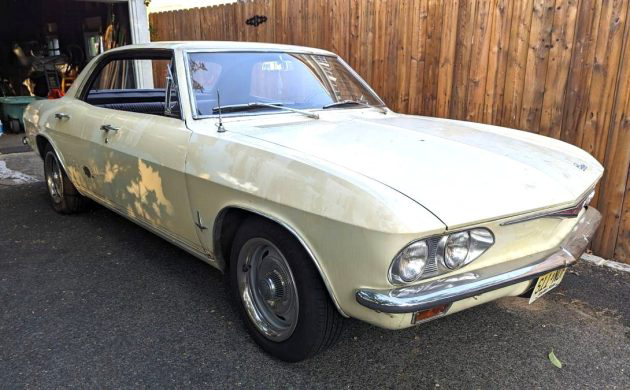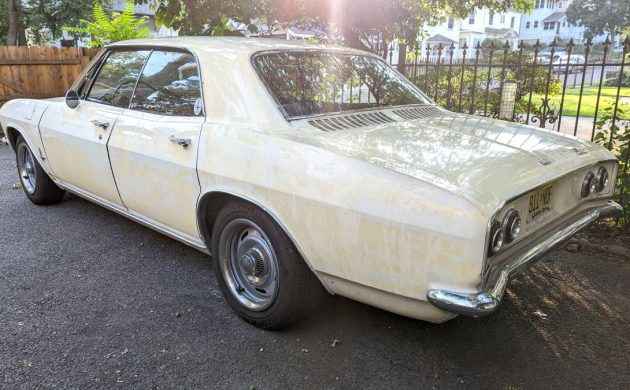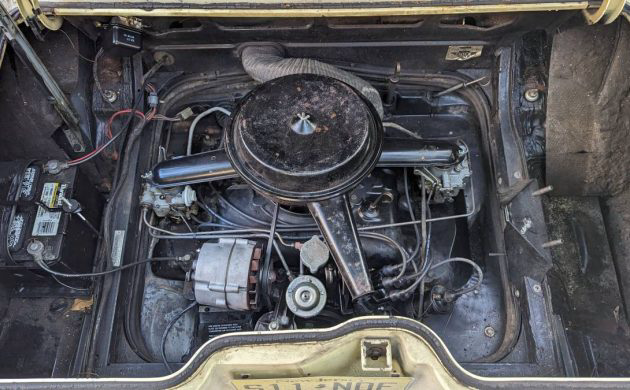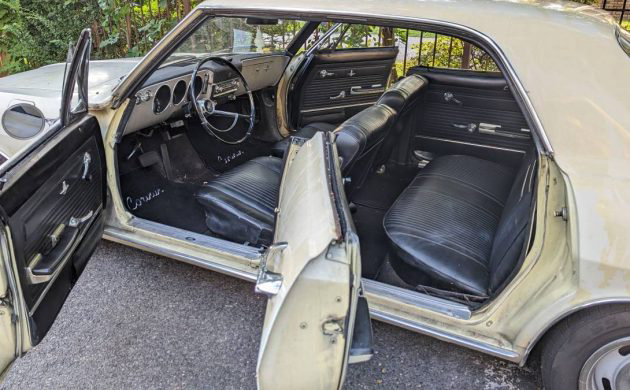Two-Owner Survivor: 1965 Chevrolet Corvair Monza
The Chevy Corvair was a novelty among U.S-built automobiles. It was the only one in the 1960s to have an air-cooled engine in the back. They were popular (initially) and sold 1.8 million copies in 10 years. But more than 70% of those units were produced in 1964 or earlier, making 1965 and later Corvairs a little harder to come by now. This ’65 Monza Sport Sedan (aka 4-door hardtop) is a two-owner vehicle that has less than 40,000 miles. It runs okay but needs a paint job. And is offered as a “cheap wheels” buy.
Corvairs were redesigned in 1965 and looked sleeker than the first generation of 1960 to 1964. Some suspension work had been done to counter Ralph Nader’s claim that the Corvair was “unsafe at any speed,” but the PR damage had been done and Corvair sales trickled off to nowhere by mid-1969 when Chevrolet decided to pull the plug. That’s a shame because the second-gen Corvair wasn’t a bad car at all.
The seller bought this ’65 Monza from its original owner in 2020. It had been sitting since 1988. Only 2,000 miles have been added under current ownership. To get the Chevy back on the road, the seller dropped some decent coins to acquire new Rally wheels and tires, a fuel delivery system servicing, brake work, a starter, alternator, battery, and a whole lot more. So, the asking price of $4,000 is mostly an attempt to recover that investment.
The seller is throwing in other stuff for the buyer to install, such as a weatherstripping kit, side mirrors, and an aftermarket sound system. The interior may be okay, but the body has some rust to address before doing a repaint. A car cover is also included along with some documentation. Located in East Orange, New Jersey, this Corvair project can be yours here on craigslist. You could buy it and take it to Cars & Coffee the way it is because few others like it will be there. Our thanks to Gunter Kramer (tip-meister) once again!
Auctions Ending Soon
 2006 Ford Mustang Saleen S281 SCBid Now18 hours$15,000
2006 Ford Mustang Saleen S281 SCBid Now18 hours$15,000
 2002 Subaru Impreza WRXBid Now3 days$100
2002 Subaru Impreza WRXBid Now3 days$100
 1975 Chevrolet Corvette ConvertibleBid Now3 days$3,000
1975 Chevrolet Corvette ConvertibleBid Now3 days$3,000
 1964 Ford F-100 Camper CustomBid Now3 days$2,000
1964 Ford F-100 Camper CustomBid Now3 days$2,000
 2006 Jeep Wrangler SportBid Now5 days$10,500
2006 Jeep Wrangler SportBid Now5 days$10,500





Comments
This car will not last long. It’s a really fair price when you consider finding a relatively rust free Corvair on the east cost is not easy. The 4 door LM (late model) cars are more rare than their coupe counterparts because nobody saved them. If this was in my neighborhood I would probably buy it but I have a good lead on a 61 Lakewood wagon that will be fun to own as well.
What’s not to like about a Corvair unless your name is Ralph? A high school buddy had one with a push button gear shifter on the dash. Cost him all of $75 in 1969. I forget what year it was.
No push buttons on the Covairs. The automatics have a T handle on the right side of the dashboard that goes up and down to select gears. With the right engines they aren’t as slow as most folks think.
As the proud owner of a 66 Monza coupe I am glad this isn’t closer to me. Lots of fun for the new owner. Glwts
I had a 64 Monza that YENKO STINGER did a job on very quick and ATE Porsches.
I had this exact model but with the full list of options. Wire wheel covers, AM/FM, wood wheel, tilt& telescope. 140Hp ENGINE,(4 CARBS). Front & rear bumper guards. Drove the car from new until 50K miles. Sold it for a 1967 Cougar XR7 with factory AC and a 3 speed manual trans.
I always felt safe driving the Corvair. I was in Michigan with it on snow many times. We drove it to Boston and a few other road trips also. I put the car on a chassis dynameter and did a power test. The engine was rated at 140 HP. It registered 34 HP at the rear wheels.
I had a 69 that had 140 up at the rear wheels. It was highly modified. Yes we had it. On the dyno
36hp net out of 110hp gross ? My vw bug had better than that, also 500lbs less and 28mpg and cheaper new cost!!!
Fred: The highest HP engine available in the 4 door Corvair was the 140 HP. That is the engine I had. Where the big loss occurs is in the automatic transmission. The manufacturer HP claims were are calculated at the flywheel. I am hard pressed to think of any industry that really tells the truth anymore. Maybe in the medical feed. We do not want a replacement heart to be over rated and then have the performance fall short.
Chassis dynos have considerable variation, (weight, tire size, traction, heat, not to mention the calibration of the dyno itself). This is why net hp is measured at the flywheel with all accessories and gross without accessories at the flywheel by manufacturers. There is nothing scientific about a chassis dyno.
As an anecdote, I once saw a 1970 Ram Air III 400 GTO turn only 140 on a chassis dyno…
This is definitely a car I would snatch up being that it is near me. Can’t fit another in the garage…
Jason V. The dynameter was continually maintained and was primarily used for to test highway tractors. I also expected this rating the dyno gave me. Automatic transmissions “chew up” horsepower.
I always thought the second generation 4 door hardtop Corvairs had really nice lines, I love yhe Coke Bottle lines that GM favored in those days, and the Corvair wore those lines very nicely. This looks solid I hope it goes to a great home and driven and enjoyed.
Nice example….I thought this was as good looking as any 4dr hardtops of the day….cool it survived.
I had a 69 that had 140 up at the rear wheels. It was highly modified. Yes we had it. On the dyno
My Corvair was a 1965. I was replacing a French Renault. The Corvair was a most enjoyable car. I believe the 4 door was available for only a couple of years more. 1969 only the two door was available. I never liked the styling of the 2 doors. I was a coordinator between Ford Motor and Cummins Engine. Can you believe Ford complained about a Chevrolet Corvair being parked at the experimental truck building in Dearborn. I was asked to drive a Ford product. I told my boss I could not afford a Ford, they were priced too high. He got me a 1967 Cougar XR7 with AC many options for $2,750.00 I now sold the corvair and remain a Ford customer to this day. 58 years later.